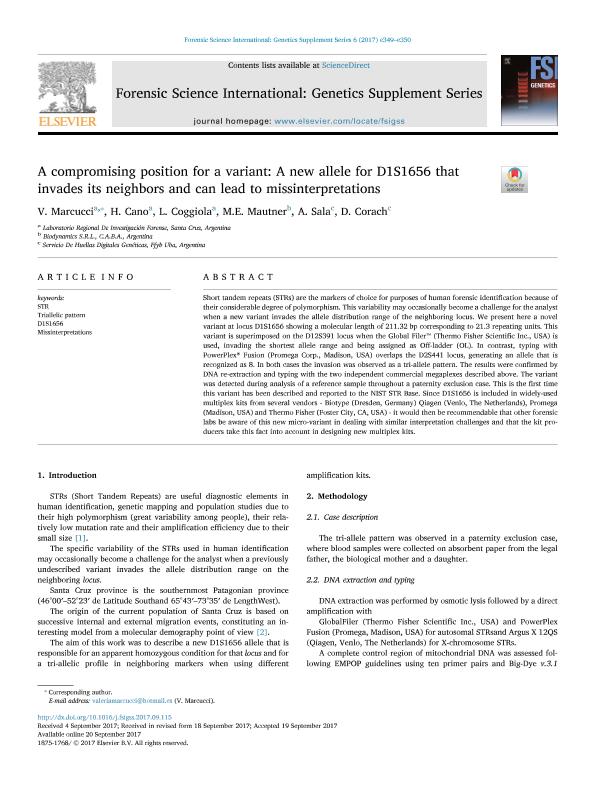Mostrar el registro sencillo del ítem
dc.contributor.author
Marcucci, Valeria Cecilia

dc.contributor.author
Cano, H.
dc.contributor.author
Coggiola, Liliana

dc.contributor.author
Mautner, M. E.
dc.contributor.author
Sala, Adriana Andrea

dc.contributor.author
Corach, Daniel

dc.date.available
2019-05-06T20:13:19Z
dc.date.issued
2017-12
dc.identifier.citation
Marcucci, Valeria Cecilia; Cano, H.; Coggiola, Liliana; Mautner, M. E.; Sala, Adriana Andrea; et al.; A compromising position for a variant: A new allele for D1S1656 that invades its neighbors and can lead to missinterpretations; Elsevier B.V.; Forensic Science International: Genetics; 6; 12-2017; 349-350
dc.identifier.issn
1872-4973
dc.identifier.uri
http://hdl.handle.net/11336/75663
dc.description.abstract
Short tandem repeats (STRs) are the markers of choice for purposes of human forensic identification because of their considerable degree of polymorphism. This variability may occasionally become a challenge for the analyst when a new variant invades the allele distribution range of the neighboring locus. We present here a novel variant at locus D1S1656 showing a molecular length of 211.32 bp corresponding to 21.3 repeating units. This variant is superimposed on the D12S391 locus when the Global Filer™ (Thermo Fisher Scientific Inc., USA) is used, invading the shortest allele range and being assigned as Off-ladder (OL). In contrast, typing with PowerPlex® Fusion (Promega Corp., Madison, USA) overlaps the D2S441 locus, generating an allele that is recognized as 8. In both cases the invasion was observed as a tri-allele pattern. The results were confirmed by DNA re-extraction and typing with the two independent commercial megaplexes described above. The variant was detected during analysis of a reference sample throughout a paternity exclusion case. This is the first time this variant has been described and reported to the NIST STR Base. Since D1S1656 is included in widely-used multiplex kits from several vendors - Biotype (Dresden, Germany) Qiagen (Venlo, The Netherlands), Promega (Madison, USA) and Thermo Fisher (Foster City, CA, USA) - it would then be recommendable that other forensic labs be aware of this new micro-variant in dealing with similar interpretation challenges and that the kit producers take this fact into account in designing new multiplex kits.
dc.format
application/pdf
dc.language.iso
eng
dc.publisher
Elsevier B.V.

dc.rights
info:eu-repo/semantics/openAccess
dc.rights.uri
https://creativecommons.org/licenses/by-nc-sa/2.5/ar/
dc.subject
D1s1656
dc.subject
Missinterpretations
dc.subject
Str
dc.subject
Triallelic Pattern
dc.subject.classification
Otras Ciencias Biológicas

dc.subject.classification
Ciencias Biológicas

dc.subject.classification
CIENCIAS NATURALES Y EXACTAS

dc.title
A compromising position for a variant: A new allele for D1S1656 that invades its neighbors and can lead to missinterpretations
dc.type
info:eu-repo/semantics/article
dc.type
info:ar-repo/semantics/artículo
dc.type
info:eu-repo/semantics/publishedVersion
dc.date.updated
2019-04-16T22:40:46Z
dc.identifier.eissn
1875-175X
dc.journal.volume
6
dc.journal.pagination
349-350
dc.journal.pais
Irlanda

dc.journal.ciudad
Amsterdam
dc.description.fil
Fil: Marcucci, Valeria Cecilia. Universidad Nacional de la Patagonia Austral; Argentina
dc.description.fil
Fil: Cano, H.. Laboratorio Regional de Investigación Forense; Argentina
dc.description.fil
Fil: Coggiola, Liliana. Laboratorio Regional de Investigación Forense; Argentina
dc.description.fil
Fil: Mautner, M. E.. Biodynamics Sa; Argentina
dc.description.fil
Fil: Sala, Adriana Andrea. Consejo Nacional de Investigaciones Científicas y Técnicas; Argentina. Universidad de Buenos Aires. Facultad de Farmacia y Bioquímica. Servicio de Huellas Digitales Genéticas; Argentina
dc.description.fil
Fil: Corach, Daniel. Consejo Nacional de Investigaciones Científicas y Técnicas; Argentina. Universidad de Buenos Aires. Facultad de Farmacia y Bioquímica. Servicio de Huellas Digitales Genéticas; Argentina
dc.journal.title
Forensic Science International: Genetics

dc.relation.alternativeid
info:eu-repo/semantics/altIdentifier/url/https://www.sciencedirect.com/science/article/pii/S1875176817301002
dc.relation.alternativeid
info:eu-repo/semantics/altIdentifier/doi/http://dx.doi.org/10.1016/j.fsigss.2017.09.115
Archivos asociados
